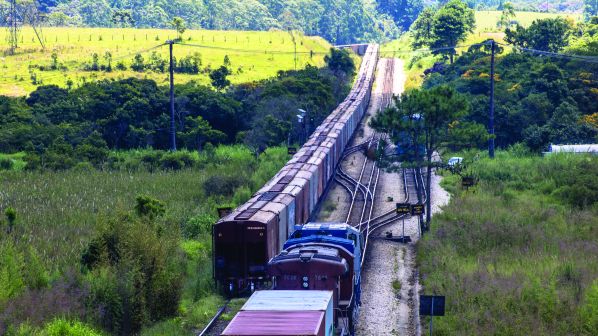BRAZIL’s “Rail Month” in September resulted in more than Reais 91.972bn ($US 16.56bn) in investments in the rail sector, the Brazilian Association of the Railway Industry (Abifer) says. The month was a concentrated effort by the federal government, through the Ministry of Infrastructure (Minfra), to encourage private investment in the expansion of the railway network and to encourage rail transport from north to south.
The total was announced during the “Advances in the Brazilian Railway Industry” webinar hosted by Abifer in partnership with Minfra on October 1. Projects announced during the month included both the development of new freight lines and mechanisms to ensure the expansion of passenger rail in large urban centres such as Belo Horizonte, Minas Gerais, and São Paulo.
The government received 19 requests to build new lines under the Pro Rail law passed on September 2, totalling 5360km of track across 12 regions, with a total value of Reais 80.5bn.
A contract was signed by Bahia Mineração (Bamin) on September 3, in the presence of president, Mr Jair Bolsonaro, and the minister of infrastructure, Mr Tarcísio Gomes de Freitas, for the West-East Integration Railroad (Fiol) concession. Auctioned in April, the concession includes Reais 3.3bn in private investment. When completed, the 1527km line will connect the future port of Ilhéus, on the coast of Bahia, with the municipality of Figueirópolis, in Tocantins, and connect the North-South Railroad (FNS) with the national network.
An addendum to the Guarulhos Airport concession agreement was signed, providing for the construction of an Automated People Mover (APM) between the airport’s passenger terminals and São Paulo Metropolitan Train Company’s (CPTM) Line 13-Jade. The Reais 272m project is scheduled to begin in January 2022.
On September 17, work began on the first section of the Midwest Integration Railroad (Fico), which includes 383km of new track between Mara Rosa, Goiás, and Água Boa, Mato Grosso. Vale will invest Reais 2.7bn in the line in exchange for the early renewal of the Vitória-Minas Railroad (EFVM) concession.
Minfra and the National Association of Passenger Rail Operators (ANPTrilhos) signed a 12-month extension to a partnership to develop a national policy for passenger rail. The initiatives include a study into the existing situation for passenger rail in Brazil, an examination of international standards, and the development of a transport plan including an outline of potential services and the classification of identified stretches and corridors.
Tarcísio visited Baixada Santista, São Paulo, on September 21 to see the rail projects proposed by the private sector to increase the efficiency of freight transport to the Port of Santos. The Baixada Santista railway, which is managed by MRS Logístics, is already carrying 45 million tonnes out of the total capacity of 50 million tonnes a year. The line will be upgraded in 2022 through a Reais 2bn investment. The concession for the line expires in 2025, with the proposal to renew this early currently being examined by the Federal Audit Court.
Rail Month concluded on September 30 with the approval of the National Congress Bill (PLN) for the expansion of the metro in Belo Horizonte, including the extension of Line 1 and the construction of Line 2 at a cost of Reais 3.2bn. The federal government will provide Reais 2.8bn and the Minas Gerais State government will provide Reais 400m, with other funding coming from the private sector after a concession is awarded.
For detailed data on rail projects in Brazil and around the world, subscribe to IRJ Pro.
An examination of the current situation for freight railways in Brazil appeared in the October issue of IRJ.

